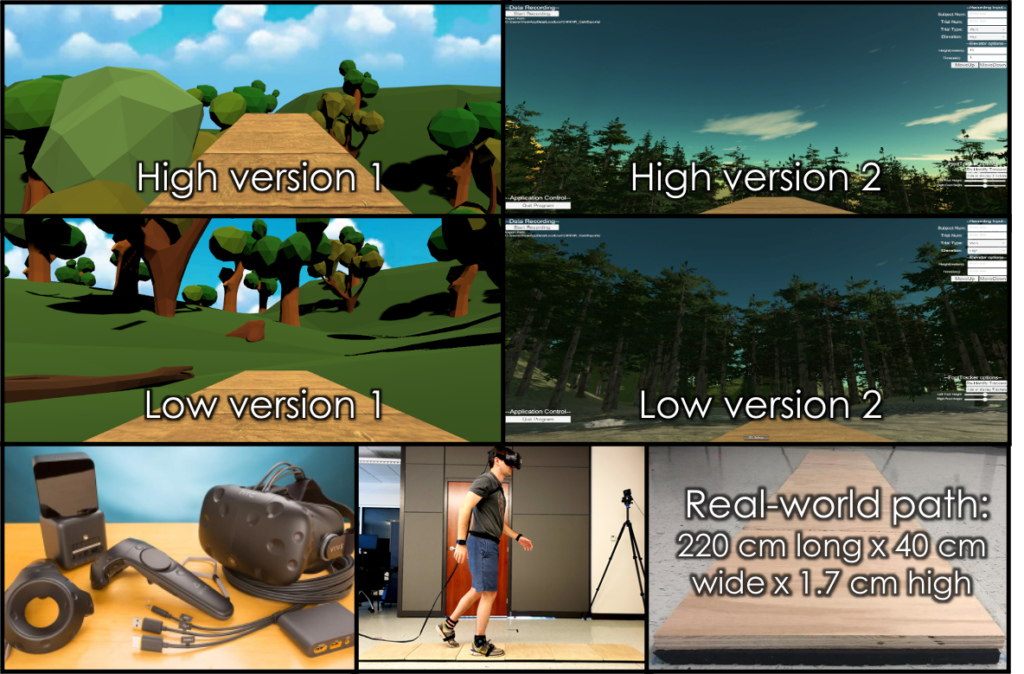By Dr Tiphanie Raffegeau, Dr Brad Fawver and Dr William Young
Fear of falling profoundly affects a person’s balance control and walking, and paradoxically, might increase their risk of falling. The influence of such mobility-related anxiety is often tested by having people stand on the edge of an elevated platform. Based on this approach, our team developed a virtual reality (VR) program to induce mobility-related anxiety and examine the effects of simulated balance threats on balance and walking behavior.
Working in collaboration with software developers in the Spencer S. Eccles Health Science Library at the University of Utah led by Ben Engel, we created a simulation inspired by a popular game: “Richies Plank Experience.” Designed with Unity3D software (Unity Technologies, San Francisco, CA. USA ), a realistic rendering of a local outdoor setting was incorporated to deliver an anxiety-inducing ‘plank-walking’ simulation (Figure 1). The program has a plank-matching feature which uses the handheld controllers to capture four locations at each corner of any straight walkway. The spatial coordinates match the dimensions of the real and virtual walkways so what people see in VR is the same as what they feel when their feet touch the real platform edges. The feeling is enhanced by wearing a pair of virtual sneakers (system accessories worn around the ankle) that track their foot motion in the VR simulation. Finally, the program features an ‘elevator’ function, that raises the walkway level at customizable height and speed.
The effectiveness of the VR height illusion, shown by performance changes from low to high VR heights, is documented in slower turning behavior and direction-dependent standing balance (see Raffegeau et al., 2020a, 2020b). The success of the VR height illusion is supported by increased self-reported cognitive (e.g., worry) and somatic (e.g., tension) anxiety, more mental effort dedicated to the task, and less confidence in one’s ability to complete the task at VR high heights (Raffegeau et al., 2020a). We also detected increased heart rate variability (Coefficient of Variation) when participants stood at high elevations using a commercial heart rate monitor (Polar M430) (Raffegeau et al., 2020b) providing more support for the effectiveness of our paradigm.
In the future, we plan to improve the VR height illusion by determining the best method of delivering the experiment (e.g., timing, transportation to height, etc.) and scaling the virtual foot representation to each person. Future experiments will include obstacles to avoid and added cognitive tasks to study anxiety-related detriments to everyday mobility demands.
The program is accessible through Ben Engel’s github (see Raffegeau et al., 2020a).

Figure 1: Top: Progression of VR program development/design from initial version 1 (left) to current realistic version 2 (right) designed to represent an outdoor location in Park City, Utah. Note, the researcher’s user interface is shown. Bottom: the HTC Vive VR system equipment (left), a person fitted with the VR head mounted display walking on our path (middle), and the real-world path that is matched in the virtual world using the plank matching feature (right).
Low height VR walk video:
High height VR walk video:
Publications
Raffegeau, T.E., Fawver, B., Young, W. R., Williams, A. M., Lohse, K. R., and Fino, P. C. (2020a) The direction of postural threat alters standing balance control when standing at virtual elevation, Experimental Brain Research, 238(11), 2653 2663. https://www.sciencedirect.com/science/article/pii/S0966636220300072?via%3Dihub
Raffegeau, T.E., Fawver, B., Clark, M., Engle, B., Young, W. R., Williams, A. M., Lohse, K. R., and Fino, P. C. (2020b) The feasibility of using virtual reality to induce mobility-related anxiety during turning, Gait & Posture, 77, 6-13. https://doi.org/10.1016/j.gaitpost.2020.01.006
About the Author
Tiphanie E. Raffegeau, PhD
University of Utah, Department of Health and Kinesiology and Population Health Sciences
Dr. Raffegeau is a postdoctoral research fellow who studies balance control and fall-risk in older adults. Her research focuses on underlying cognitive and emotional factors that are related to complex mobility behaviors and fall-risk.
Brad Fawver, PhD
US Army Medical Research Directorate-West, Walter Reed Army Institute of Research
Brad is a Principal Investigator at Walter Reed Army Institute of Research. His research focuses broadly on how affective states influence the learning and execution of motor skills. He also studies coping/regulation strategies within stressful environments and the development of perceptual-cognitive expertise across sport, military, and clinical contexts.
William R Young, PhD
Sport and Health Sciences, University of Exeter
Will is a Rehabilitation Psychologist. His research relates to psychological determinants of altered balance and gait, particularly in older adults and people with Parkinson’s.
Copyright
© 2020 by the author. Except as otherwise noted, the ISPGR blog, including its text and figures, is licensed under a Creative Commons Attribution-ShareAlike 4.0 International License. To view a copy of this license, visit https://creativecommons.org/licenses/by-sa/4.0/legalcode.
ISPGR blog (ISSN 2561-4703)
Are you interested in writing a blog post for the ISPGR website? If so, please email the ISGPR Secretariat with the following information:
- First and Last Name
- Institution/Affiliation
- Paper you will be referencing


